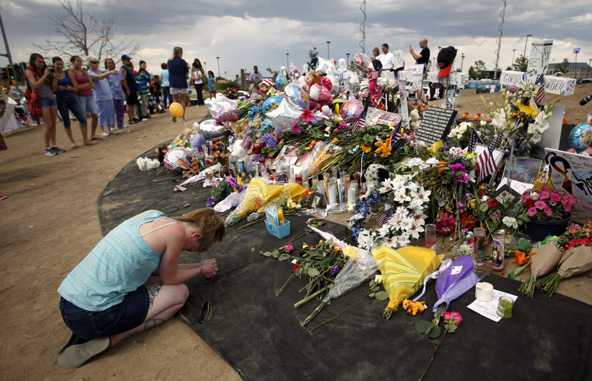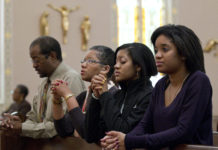
The loss of a loved one to murder is unfathomable. When life is unjustly ripped away, it tears at the fabric of communities, instills fear and anger, and irrevocably alters the foundation of the family left behind in mourning.
In recent years, we’ve witnessed tragic losses of life more times than we care to remember. Fresh in our memories is the senseless taking of life at an Aurora, Colo., movie theater last month. Twelve people died and 58 others were injured when a gunman viciously attacked a theater crowded with people there to watch “The Dark Knight Rises.”
On Aug. 5, a white supremacist stormed a Sikh temple in Wisconsin and opened fire, killing six people and wounding four others. He then took his own life.
Closer to home, 19 innocent bystanders were shot outside a Tucson supermarket on Jan. 8, 2011, including former U.S. Representative Gabrielle Giffords, who is recovering from a gunshot injury to her head. Six people died.
These tragedies raise countless questions, including the one big question for which there can be no satisfactory answer: Why?
Frustratingly, those of us left behind to grieve will never know. But the inability to know why terrible things happen to good people will not persuade our instinctual drive to seek closure, to find a way to punctuate the last sentence in a chapter filled with pain before turning the page and moving on.
Relatives of Kevin Swaney — one of two young men brutally murdered in 1987 by Daniel Wayne Cook — are among those who sought closure for 25 years. Cook was executed by lethal injection Aug. 8 in Florence, Ariz. He was the fifth Arizona death row inmate executed this year.
The Associated Press reported that Swaney’s oldest sibling called the execution “long overdue” and urged the judicial system “to take the families of those left behind into consideration so that they are allowed to move on with their lives and not be forced to relive the nightmare over and over again.”
‘Rare, if not practically nonexistent’
Capital punishment as a means of justice or deterrent has been a hotly debated topic for years. People of good will passionately argue both for and against the death penalty, and there is little doubt that the conversation regarding its morality will not soon subside.
The Catholic Church holds that all life is sacred, even the life of a death row inmate. The Church’s position is rooted in the Fifth Commandment, which instructs: “You shall not kill.”
The Catechism of the Catholic Church does not explicitly forbid the use of the death penalty “if this is the only possible way of effectively defending human lives against the unjust aggressor.” It does provide clarity insofar as it recognizes that the state is now more capable of protecting its citizens through other, non-lethal methods. Moreover, the Catechism states that the instances for which the death penalty would be permissible “are very rare, if not practically nonexistent.”
The State of Arizona is one of 33 that still permit the use of the death penalty. In April, the governor of Connecticut signed a bill into law abolishing it, replacing the use of capital punishment with life-in-prison sentences. Other states to recently repeal the death penalty include Illinois, New Jersey, New Mexico and New York.
Arizona should follow these states’ lead in this matter.
Those whose lives have been torn apart due to murder deserve our most heartfelt compassion. Those responsible for such heinous crimes deserve to be punished. Victims deserve justice and our citizens deserve protection, but state-sponsored executions do not serve to protect. Therefore, capital punishment is wrong.
On Aug. 7, Jared Loughner pleaded guilty in federal court to the 2011 Tucson shootings. In doing so, he avoided the death penalty and will be sentenced to life in prison. Remarkably, the reaction by the victims, their family and the community was not one of anger, but of relief and hope — and a chance to achieve some closure.
Mark Kelly, husband of former Rep. Giffords, was quoted as being satisfied with Loughner’s plea: “Avoiding a trial will allow us — and we hope the whole Southern Arizona community — to continue with our recovery and move forward with our lives,” Kelly said.
State-sponsored executions do not serve justice. Nor are executions likely to provide adequate closure for victims. Instead, the death penalty promotes a form of vengeance that perpetuates a circle of violence and contributes to a “culture of death.”
As Catholics, we are called to uphold the dignity and sanctity of human life at every stage. When bad things happen to good people, we may never be able to answer the question, “Why?” But we know what we are compelled to do when others demand that the state practice vengeance: protect the sanctity of life, even for those who by their horrendous crimes have shown they do not share our commitment to the Gospel of Life.
—
This editorial appears in the Aug. 16, 2012, print edition of The Catholic Sun.




![[VIDEO] Make Sunday feel like Sunday again](https://www.catholicsun.org/wp-content/uploads/2021/04/2021-YOUTUBE-BISHOP-MESSAGE-THUMBNAIL-ENGLISH-218x150.png)

